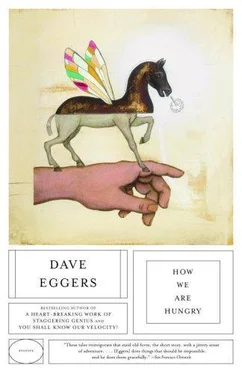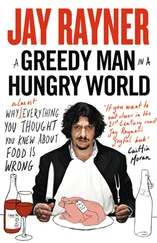Dave Eggers - How We Are Hungry
Здесь есть возможность читать онлайн «Dave Eggers - How We Are Hungry» весь текст электронной книги совершенно бесплатно (целиком полную версию без сокращений). В некоторых случаях можно слушать аудио, скачать через торрент в формате fb2 и присутствует краткое содержание. Год выпуска: 2005, Издательство: Vintage Canada, Жанр: Современная проза, на английском языке. Описание произведения, (предисловие) а так же отзывы посетителей доступны на портале библиотеки ЛибКат.
- Название:How We Are Hungry
- Автор:
- Издательство:Vintage Canada
- Жанр:
- Год:2005
- ISBN:нет данных
- Рейтинг книги:3 / 5. Голосов: 1
-
Избранное:Добавить в избранное
- Отзывы:
-
Ваша оценка:
- 60
- 1
- 2
- 3
- 4
- 5
How We Are Hungry: краткое содержание, описание и аннотация
Предлагаем к чтению аннотацию, описание, краткое содержание или предисловие (зависит от того, что написал сам автор книги «How We Are Hungry»). Если вы не нашли необходимую информацию о книге — напишите в комментариях, мы постараемся отыскать её.
A Heartbreaking Work of Staggering Genius
How We Are Hungry — читать онлайн бесплатно полную книгу (весь текст) целиком
Ниже представлен текст книги, разбитый по страницам. Система сохранения места последней прочитанной страницы, позволяет с удобством читать онлайн бесплатно книгу «How We Are Hungry», без необходимости каждый раз заново искать на чём Вы остановились. Поставьте закладку, и сможете в любой момент перейти на страницу, на которой закончили чтение.
Интервал:
Закладка:
“Some other guy was wearing them.”
“How long did it take before the sunglasses were on this other guy?”
“Fifteen minutes.”
“Why’s that, Mike?”
“Because you’re supposed to give stuff to Patrick first.”
“Right. Listen, people. There’s a pecking order here, and Patrick knows the score. If you have a wave of generosity come over you and wanna give someone your lunch or your shoelaces or something, you give it to Patrick. He’ll distribute whatever it is. That’s the only way it’s fair. That understood? You’re here to walk and they’re here to work.”
Everyone nods.
“Why you giving your sunglasses away anyway, Mike? You’re sure as hell gonna need ’em these next couple days. You get to the top and you’re—”
“I’m going down,” Mike says.
“What?”
“I have to go down,” Mike says, staring at Frank, the sun lightening his blue eyes until they’re sweater-gray, almost colorless. “I don’t have the desire any more.”
“The desire, eh?”
Frank pauses for a second, and seems to move, silently, from wanting to joke with Mike to wanting to talk him out of it to accepting the decision. It’s clear he wants Jerry to say something, but Jerry is silent. Jerry will speak to Mike in private.
“Well,” Frank says, “you know it when you know it, I guess. Patrick’ll get a porter to walk you down.”
Mike and Frank talk about how it will work. All the way down in one day? That’s best, Frank says. That way you won’t need provisions. Who brings my stuff? You carry your pack, a porter will carry the duffel. Get in by nightfall, probably, and Godwill will be there to meet you. Who’s Godwill? The driver. Oh, the older man. Yes. Godwill. He’ll come up to get you. If the park rangers think it’s an emergency, they’ll let him drive about half the way up. So how much of a hike will we make down? Six hours. I think I can do that. You can, Mike, you can. You’ll have to. No problem. Thanks for playing. Better luck next time.
Jerry still hasn’t said anything. He is eating his porridge quickly, listening. He is now chewing his porridge, his face pinched, his eyes planning.
After breakfast Rita is walking to the toilet tent and passes the cooking tent. There are six porters inside, and a small tight group outside — younger porters, mostly, each holding a small cup, standing around a large plastic tub, like those used to bus dishes and silverware. Kassim is there; she recognizes him immediately because he, like all of the porters, wears the same clothes each day. There is another sweatshirt she knows, with a white torso and orange sleeves, a florid Hello Kitty logo on the chest. Rita tries to catch Kassim’s eye but he’s concentrating on the cooking tent. Steven steps through the flaps with a silver bowl and overturns it into the tub. The young porters descend upon it, stabbing their cups into the small mound of porridge until it’s gone in seconds.
The trail makes its way gradually upward and winds around the mountain, and Mike, groaning with every leaden step, is still with them. Rita doesn’t know why he is still with the group. He is lagging behind, with Patrick, and looks stripped of all blood and hope. He is pale, and he is listing to one side, and is using hiking poles as an elderly man would use a cane, unsure and relying too heavily on that point at the end of a stick.
The clouds are following the group up the mountain. They should stay ahead of the clouds, Frank told them, if they want to keep warm today. There has been talk of more rain, but Frank and Patrick believe that it won’t rain at the next camp — it’s too high. They are hiking in a high desert area called the Saddle, between the peaks of Mawenzi, a mile away and jagged, and Kibo, above. The vegetation is now sparse, the trees long gone. Directly above the trail stands the mountain, though the peak is still obscured by cloud cover. She and Grant are still the only ones who have seen it, at midnight under the bright small moon.
Two hours into the day, Rita’s head begins to throb. They are at 11,200 feet and the pain comes suddenly. It is at the back of her skull, where she was told the pain would begin and grow. She begins to breathe with more effort, trying to bring more oxygen into her blood, her brain. Her breathing works for small periods of time, the pain receding, though it comes back with ferocity. She breathes quickly, and loudly, and the pain moves away when she is walking faster, and climbing steeper, so she knows she must keep going up.
She walks with a trio of South Africans who have driven to Tanzania from Johannesburg. She asks them how long it took, the drive, and guesses at sixteen, eighteen hours. They laugh, no, no — three weeks, friend, they say. There are no superhighways in East Africa! they say. They walk along an easy path, a C-shape around the mountain, through a field of shale. The rocks are the color of rust and whales, shards that tinkle and clink, loudly, under their feet.
The path cuts through the most desolate side of Kilimanjaro, an area that looks like the volcano had spewed not lava but rusted steel. There is a windswept look about it, the slices of shale angled away from the mountaintop as if still trying to get away from the center, from the fire.
They descend into a valley, through a sparse forest of lobelia trees, all of them ridiculous-looking, each with the gray trunk of a coconut tree topped by an exuberant burst of green, a wild head of spiky verdant hair. A stream runs along the path, in a narrow and shallow crack in the valley wall, and they stop to fill their water bottles. The four of them squat like gargoyles and share a small vial of purification pills. They drop two of the pills, tiny and the color of steel, into the bottles and shake. They wait, still squatting, until the pills have dissolved, then they drop in small white tablets, meant to improve the water’s taste. They stand.
She decides she will jog ahead of the South Africans, down the path. Weighing the appeal of learning more about the economic situation in sub-Saharan Africa against the prospect of running down this trail and making it to camp sooner, she chooses to run. She tells them she’ll see them at the bottom and when she begins jogging, she immediately feels better. Her breathing is denser and her head clears within minutes. Exertion, she realizes, must be intense and constant.
There is a man lying in the path just ahead, as it bends under a thicket of lobelias. She runs faster, toward him. The body is crumpled as if it had been dropped. It’s Mike. She is upon him and his skin is almost blue. He is asleep. He is lying on the path, his pack still strapped to his back. She dumps her pack and kneels beside him. He is breathing. His pulse seems slow but not desperate.
“Rita.”
“You okay? What’s wrong?”
“Tired. Sick. Ashley is killing me. Want to go home.”
“Well, I’m sure you’ll get your wish now. You’re a mess.”
He smiles.
Rita helps him stand and they walk slowly down the valley to the camp. It is spread out in a wide valley, the tents on the edge of a cliff — the camp this third day is stunning. It’s late afternoon when they arrive and the sun is out and everywhere. This is the Great Barranco Valley, sitting high above the clouds, which lie like an ocean beyond the valley’s mouth, as if being kept at bay behind glass.
The tents are assembled and she helps him inside one, his head on a pillow of clothes, the sun making the interior pink and alarming. When Jerry, already at camp and washing his socks in the stream, notices that his son is present, he enters the tent, asks Rita to leave, and when she does, zips the tent closed.
In her own tent Rita is wrecked. Now that she’s not moving the pain in her head is a living thing. It is a rat-sized and prickly animal living, with great soaring breaths and a restless tail, in her frontal lobe. But there is no room for this animal in her frontal lobe, and thus there is great strain in her skull. The pain reaches to the corners of her eyes. At the corners of her brow someone is slowly pushing a pen or pencil, just behind her eyes and through, into the center of her head. When she places her first and second fingers on the base of her skull, she can feel a pulsing.
Читать дальшеИнтервал:
Закладка:
Похожие книги на «How We Are Hungry»
Представляем Вашему вниманию похожие книги на «How We Are Hungry» списком для выбора. Мы отобрали схожую по названию и смыслу литературу в надежде предоставить читателям больше вариантов отыскать новые, интересные, ещё непрочитанные произведения.
Обсуждение, отзывы о книге «How We Are Hungry» и просто собственные мнения читателей. Оставьте ваши комментарии, напишите, что Вы думаете о произведении, его смысле или главных героях. Укажите что конкретно понравилось, а что нет, и почему Вы так считаете.












